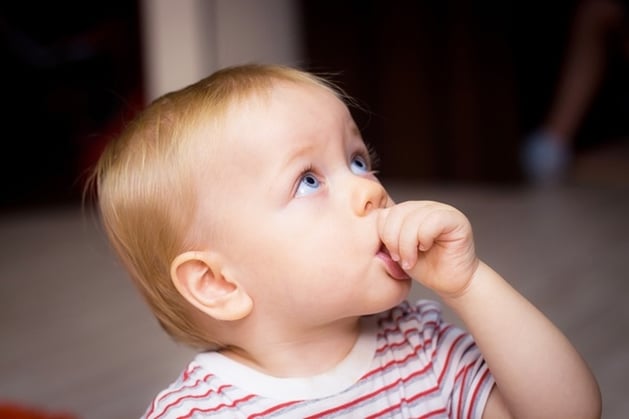
Kids will stick just about anything in their mouths, including their fingers. Thumb-sucking is a reflexive and common habit for little ones, as it can help them feel secure and simply provides something to do. However, it's also a typical concern for parents. Moms and dads alike frequently ask questions about age appropriateness and health, namely regarding thumb-sucking and oral care. Read on to discover how this habit may affect your child's teeth and what you can do about it:
"Thumb-sucking can affect the growth of the permanent teeth."
Potential dental damage
While it's normal for kids to suck on their thumbs, it may affect their oral health if the habit continues for too long. Specifically, changes in the mouth or teeth may occur if the child sucks his or her thumb past the age of five or six.1 The frequency and intensity of the habit will also affect how severe or prevalent these oral conditions are.2 For example, children who merely rest their thumbs in their mouths while sleeping may be less likely to experience permanent dental damage. Meanwhile, those who aggressively suck at their thumbs, allowing the finger to push the roofs of their mouths or the back of their teeth, have a greater chance of oral manipulations.
Children typically start losing baby teeth after age five when permanent teeth are ready to erupt.3 Thumb-sucking becomes a bigger problem around this time because it can affect the growth of the permanent teeth. For instance, thumb-sucking may inadvertently cause a child to push his or her front teeth forward, which can ultimately affect alignment. Misaligned teeth can cause anything from gum disease to problems chewing and speaking. What's more, an overbite can also lead to problems with the roof of the mouth and require braces.
Breaking the habit
If your children suck their thumbs beyond the age of five, it's important to find a dentist to discuss the consequences of this habit and courses of action to break it. A dental health professional may be able to detect signs of misalignment before orthodontic intervention becomes necessary. However, as damage is typically a gradual process rather than an all-at-once occurrence, you can safely wait until your kids' next biannual appointments before raising your concerns. Until then, here are at-home dental care tips you may want to try:
- Offer praise: When your children go for an entire afternoon without sucking their thumbs or they readily pull their fingers away with a single parental warning, offer them praise. Pat them on the back, hand out high fives or scoop them up for a hug.
- Use reminders: Sometimes, kids will stick their fingers in their mouths without realizing it. Gentle reminders may provide an effective way to break this subconscious behavior. Parents can come up with hand signals with their kids that when displayed let little ones know they are succumbing to thumb-sucking.4 This way, the children can even be reminded when with friends without being embarrassed. At night, you can implement the same type of strategy by slipping a sock on your children's hands before they go to bed. Even if they sleepily put their thumbs to their lips, the sock's material will prompt them to pull away.
- Discover the cause: Stressful situations at age five may trigger that same thumb-sucking habit that provided comfort at age two. If your children have difficulty breaking this habit, consider evaluating whether there's an anxiety issue at play. For example, do your kids suck their thumbs right before school? Is this a common occurrence during thunderstorms? Identifying the cause may be the best option.

Use praise and love to encourage your kids to quit their thumb-sucking habit.
While you can probably wait until the next appointment, don't hesitate to call your dental health professional's office if you're concerned about your children's thumb-sucking activities. Dentists can provide insight on healthy oral development from infancy to adulthood.
____________________________________________________________________
1. "Thumb Sucking The Good, The Bad And The Normal," Donna M. Rounsaville, RDH, BS. Colgate. http://www.colgate.com/en/us/oc/oral-health/life-stages/childrens-oral-care/article/sw-281474979286594
2. "Thumbsucking and Pacifier Use" American Dental Association. http://www.mouthhealthy.org/en/az-topics/t/thumbsucking
3. "At what age do children start losing their baby teeth?" Alan Carr, D.M.D. Mayo Clinic. http://www.mayoclinic.org/healthy-lifestyle/childrens-health/expert-answers/baby-teeth/faq-20058532
4. "Thumb sucking: Help your child break the habit," Mayo Clinic. http://www.mayoclinic.org/healthy-lifestyle/childrens-health/in-depth/thumb-sucking/art-20047038
